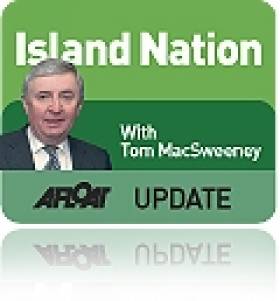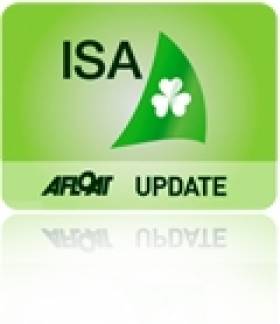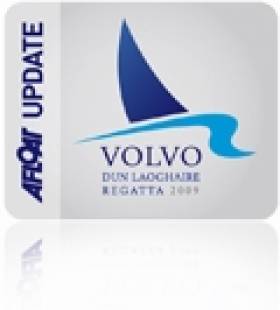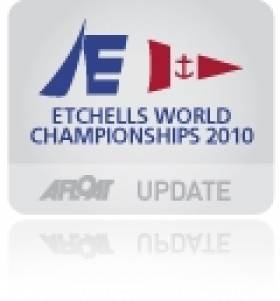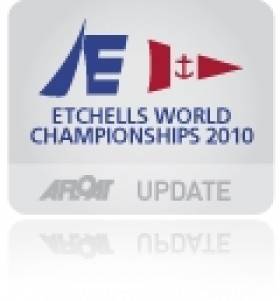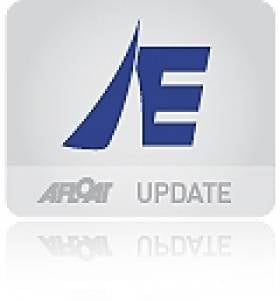Displaying items by tag: David Lovegrove
Who Is To Blame For The Decline in Sailing?
#sailing – Sailing is a sport, not the qualification of a superior social standing.
Is that fully understood by everyone involved in the sport or is there still an element of elitism which needs to be eradicated?
The term 'yachting' was dropped a few years from the title of the national representative organisation which became the Irish Sailing Association, amidst an apparent belief that 'sailing' would be less elitist as a descriptive term and more acceptable to the public.
Most 'yacht' clubs did not become 'sailing' clubs, though there are more 'sailing clubs' it would seem than 'yacht' clubs around the country. Boats did not generally become described in the American term of 'sailboats' but remained yachts.
I see no major problem with the term 'yachting' though I understand the sensitivities which surround the different terminology. I have no qualms about admitting that I own a yacht and feel fortunate to do so.
What is of more concern to me is that the sport becomes truly a 'sport for all' and is not riddled with different levels of social strata.
There remains a degree of public perception that sailing is an elitist sport. This has dogged it gaining more general acceptance and bedevilled its reputation.
Sailing, or yachting, should be a 'sport for all' in an island nation where it is based on access to the magnificent resource of waters surrounding us.
The perception of wealthy people with big boats, sitting in clubs behind signs of 'strictly private', is not conducive to creating a widely popular sport. There is a dichotomy here because the growth of interest amongst young sailors, with more involvement in dinghy sailing such as through Optimists, has been encouraging. So has the advent of more interest in schools in adopting sailing onto their sports curricula.
The movement for change within the ISA came initially from the dinghy fraternity, where many of us who now sail cruisers, began their love affair with the sport.
The breakthrough which sailing needs, to gain more general popular public acceptance, has not been made.
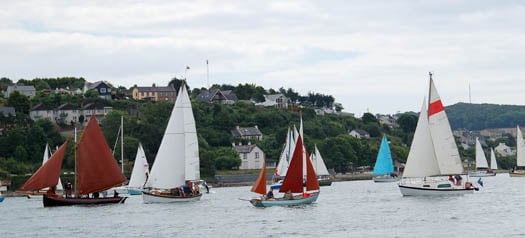
People sail boats of all types
Why is this?
Throughout my years of being a marine journalist and when marine correspondent within RTE, it was difficult to get coverage for sailing. I did achieve it, but there was always a bit of a battle to establish acceptance that the sport was not just for the wealthier part of the population, but that it permeated across all social milieu. I did get that message across by quoting figures of how many are actively involved in a day's racing organised by major clubs, compared with the attendance for example at some Irish soccer matches which got plenty of media coverage. I also stressed that it was a participative sport more than a spectator one. More people within the broadcast service have become involved in the sport. But generally in the media, there is still an impression that sailing is a sport for which you need a lot of money and this is perpetuated by the oft-quoted unfortunate analogy of standing under a cold shower and tearing up money.
But sailing – and yacht – clubs are also contributors to this failure to get the message of sailing as a sport for all across. In my experience as a journalist, most clubs are poor at their public relations and the issuing of information to the press, but yet complain that the sport does not get enough coverage, even if they do not provide the information. There are honourable exceptions, who provide good circulation of information and websites, but there are many other clubs who are pretty bad at sending information and whose websites are dismal failures, not updated for long periods of time.
At the annual meeting of the South Coast Offshore Racing Association in Kinsale Yacht Club in the Spring one participant told the audience that "yacht clubs to most people would be the scariest places to walk into."
Another said: "It is no wonder that we struggle as a sport to keep people as lifelong participants, even though we can and do attract younger people into the sport at an early age."
The warning signs have been there for years, for those who wanted to note them. Sailing needed to widen its appeal, to get more people into the sport for lifelong participation.
To survive a sport needs an organised structure and clubs are needed to provide this, they must have members who pay to join and support them. They cannot exist if people use them without joining and therefore not giving on-going financial and volunteer support.
So there is a dichotomy here. Why are clubs not getting enough members, a situation which appears widespread?
The economy over the past few years has undoubtedly been a contributory factor. People have lacked disposable income and, amongst families in particular, expenditure on non-essential matters has had to be cutback. Some clubs have responded with different arrangements for membership, but as I wrote in this blog last week, I still think that new, flexible approaches are needed, particularly to encourage crews, of which most active racing boats are short.
There are also people who sail and who do not join clubs, either they don't want to, or can't or there are not clubs close to them or for whatever reason. But they do sail, are they outside of the system and should they be considered. How can they be appealed to because they are involved in the sport. There are the traditional boats and the huge support they get. Some are members of the ISA, some of clubs, but many not so perhaps. There is a huge level of support for sailing in this sphere and many organised events which draw big support. Should the ISA reach out to these sailors, to this area of sailing activity?
This and many other aspects merit consideration to band together all interested in sailing, in all its facets. United in approach there would be a strong force which official authorities could not ignore when improved facilities and recognition are sought or when government and officialdom has to be challenged, such as in the imposition of new regulations.
On this month's edition of my radio programme, THIS ISLAND NATION, (click to play podcast above) I talked to the President of the Irish Sailing Association about his plan for a Strategic Review of the sport to deal with a decline and he accepted my suggestion that the impression of elitism is not good for the sport and has not helped its expansion and development. We also discussed whether there was too much concentration on racing and whether more support should be given to other forms of sailing, encouraging cruising.
David Lovegrove wants to get across the message that sailing is open to everyone. He would be particularly happy, he told me, if he could get that understood and accepted widely in public. We discussed how sailing can be a sport for all ages and for all people, with the uniqueness of enabling families to participate together if they wished. He recalled the time when he first got involved in sailing and the enjoyment and sense of friendship that abounded. Perhaps too, we agreed, there was less concentration then on being winners in racing and in high performance levels.
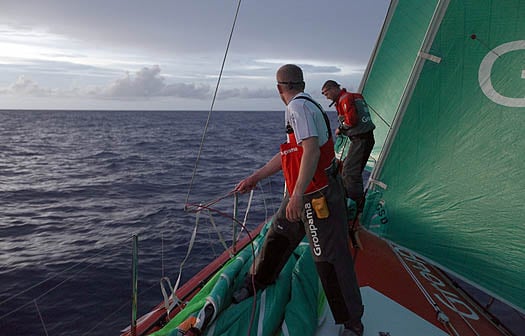
Ocean racer Damian Foxall of County Kerry
I think there is a need for Ireland to have a good presence on the international scene and that it is good for the country. It is also good for sailors to aspire to the highest levels of achievement, but have we got over-committed to competition to the detriment of the enjoyment of participation, of being on the water. Had the ISA also been too focussed on its own high performance programme and those who qualify for it and not given enough support to other sailors who may not have made it through the ISA system, but want to try on the international scene and should there be arrangements to support that. Also, for example, has the ISA been close enough to the top international sailors who have come from Ireland and sought to include them and utilise their services in promoting Irish sailing, such as Damian Foxall and Justin Slattery and where is the ISA in regard to the efforts of such as young David Kenefick making his own way onto the international scene through the Figaro Race.
All of these are interesting points to debate.
I take part in club racing, but I always try to make it clear to the crew that we are going out to enjoy ourselves and winning is not the overall aim, though it would be nice and we have been fortunate enough to do so from time-to-time. I don't like shouting on a boat, though sometimes getting something done quickly when needed can raise the vocal level. But if the enjoyment is taken out of the sport, that is not for the best.
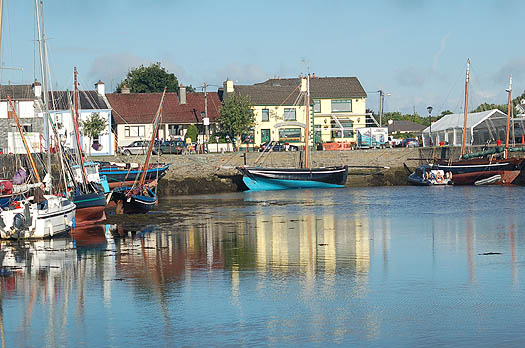
All forms of sailing need to be engaged
Again, here we have a dichotomy, other sports are hugely competitive-oriented, why should sailing not be?
There are issues to be addressed and I wish David Lovegrove and his team every success as they try to come up with answers. He told me in our interview, that this would not be a short-term solution, but would take a lot of work and commitment by the clubs themselves. Indeed. As I wrote in this blog last week, encouraging participation is essential to arrest decline. That will mean more innovative ways of involving people, a point which Denis Kiely, who has given tremendous national service to sailing made at that SCORA meeting in Kinsale and which impressed me.
He said that often crews did not get enough of a proper introduction to the sport, didn't have enough knowledge of it and weren't given such, didn't get training, could therefore feel unwelcome and then leave the sport.
Club marinas are pretty full of boats around the country, so it is at times hard to accept that there is a decline in participation, but the meetings which have led to the new approach by the ISA have shown problems, including dissatisfaction with the national association itself. David Lovegrove has accepted this and the need for change.
He spoke to me of his enthusiasm about the work ahead to re-define the sport and his confidence in the team he has appointed to oversee different aspects of the sport and to suggested changes. These are outlined in detail in the current/Summer edition of AFLOAT magazine.
His determination to create a strong, vibrant sport, is welcome. I wish him success with his efforts. Listen to his interview in my programme here on the Afloat website (above). Everyone interested in the future of our sport should respond positively. That commitment is what the sport needs.
So – who is to blame for the decline in sailing – all of us are, if we do not make changes to encourage more people into the sport and to stay in it and if we do not adapt existing systems to ensure they feel welcome. That means all of us who want to see sailing being a sport for all accepting that sailing is just that - a sport - not a badge of social approval.
Lovegrove Set For ISA Presidency In New Year
#ISA - Howth Yacht Club's David Lovegrove has been nominated to succeed Niamh McCutcheon as president of the Irish Sailing Association (ISA) next spring, as The Irish Times reports.
Lovegrove is a former commodore of his North Dublin club and presently one of Ireland's top international race officers, coming off what Afloat's WM Nixon describes as an "extraordinary" performance in the role for the J/24s in 2013.
Come 2014 he's set to preside over an era of big changes for the ISA, following the announcement last month than an independent group has been appointed to form a new strategic plan for sailing's national governing body.
The Strategic Review Group is led by the Royal St George's Brian Craig - whose role, according to Lovegrove, persuaded him to accept McCutcheon's nomination for the ISA's top job.
Indeed, Lovegrove says he's up to the challenge, telling the paper that "the ISA needs to go through a fundamental change".
The Irish Times has more on the story HERE.
First entries in for Volvo Dun Laoghaire Regatta
July's Volvo Dun Laoghaire regatta has taken in 22 entries six months ahead of the first race. It's an encouraging figure that's on a par with the 2009 VDLR, the biggest regatta in Irish sailing that year.
The positive early response is an indication, says organiser Adam Winkelmann, that the 2011 fleet, should be a bumper one too when it sets sail on July 7th for the four day event.
The emphasis is again on providing quality racing over different courses each day but organisers are also aiming to live up up to the regatta's pre-event billing as a 'Mega Party'.
The event has opened a new website, a new Facebook page (with afloat.ie, so if you're a Facebook user please show your support and 'like it'). The regatta site is also featuring the youtube clip below of events on the bay two years ago.
So far entries received are spread across nine separate classes but it's a visiting Wayfarer fleet with eight boats named already that is setting the pace. The organisers are expecting up to 50 of the two man classic design for the class National Championships that's being staged as part of the regatta.
The notice of race (NOR) was published online in October and highlighted a reduced entry fee for 'earlybird entries'. Click HERE. or scroll down to download it as a PDF. If you participated in 2009 and entered online, this year you only need to enter your email address.
Three boats are entered in the non spinnaker class and another three in the Squib keelboat. Two entries have been received in both IRC 2 and 3.
It's still too early for a table of bands to be decided but the organisers intend to give some indication of handicap break-ups as the entries build. The IRC bands will be in line with those laid down by the Irish Cruiser Racing Association.
Despite the fact the regatta's strength since 2007 is that it draws on the capital's own fleet of 400 boats it is in fact visitors from elsewhere on the east coast that are first in. East Down Yacht Club, for example, has four entries.
But locals are signing up too. Single entries have been received in the Mermaid, Beneteau 31.7, Dragon and IRC Zero classes.
Course areas are likely to stay the same according to principal Race officer con Muphy of the National YC. Th race team is Alan Crosbie - KYC, Peter Crowley - RCYC,
David Lovegrove - HYC, Harry Gallagher - HYC, Henry Leonard - RIYC, Jack Roy - RIYC and Con Murphy - NYC. Mike Butterfield will head up the jury.
The organisers are on the look out for volunteers to assist in the run up to and during the country's biggest sailing event. In 2009 over 300 helped to make it the biggest participant sport event in the country after the city marathon, with over 3,500 sailors afloat. More details from Ciara in the event office HERE.
BERTRAND WRAPS UP ETCHELLS WORLD TITLE
Australian sailing legend John Bertrand and his crew Andrew Palfry and Tom Slingsby wrapped up the 2010 Etchells World Championship title in some style at Howth (Saturday 28th) with his fifth bullet in eight races and without even needing to sail the final race of the Fingal County Council-sponsored series.
The Royal Brighton Yacht Club crew remained totally focused throughout the regatta and five firsts represented a stunning level of consistency at this level. Nearest rival Ante Razmilovic suffered gear problems before the start of the first race of the final day which forced them ashore to effect repairs. Fortunately for them, there was a general recall which gave them time to reach the re-start on time but they had a poor race to finish mid-fleet. With Bertrand taking line honours again, it was all over for the Royal Hong Kong YC team.
For Bertrand, it is the fulfilment of a dream to win a one-design class world championship to add to his Olympic bronze medal of 1976 and his famous America's Cup triumph 27 years ago. He practised on the race track for weeks before the event and his attention to detail was phenomenal, so the eventual outcome was the result of exceptional planning allied to technique, tactics and sheer sailing skill by the Aussie trio. Crewman Tom Slingsby had to forego the prize-giving dinner since he had to leave for the Laser Worlds at Hayling Island starting the next day.
In the morning race, Britain's Julia Bailey enjoyed the first beat, leading Bertrand around the top mark in a fresh 20-knot+ northerly but the Australians' superior downwind speed quickly saw that advantage wiped out. Bailey lost several places on the next leg and eventually finished 9th. Bertrand continued to stretch his lead while others swapped positions over the next two legs, with second place going to a very happy Tim Patton of Bermuda for his best result of the event. Jud Smith (Eastern YC/NYYC) and Peter Duncan (American YC) filled the next two places, with Smith the leading US entry in 7th overall going into the final race. Best of the Irish contingent was Howth's Laura Dillon on 'Lambay Rules' in 12th spot.
Irish eyes were smiling early and late in the final race, firstly with Jay Bourke of the Royal St.George YC heading the fleet around the windward mark followed closely by Peter Duncan of the USA and Howth's Dan O'Grady in 6th. By the leeward gate, another American Jud Smith had jumped from 7th to take the lead from Bourke, with O'Grady moving up another place. Smith held the lead to the finish, his win being the best score for a US team in an otherwise average week for American competitors. By the next windward mark, O'Grady had 3rd spot and by the finish, he had secured second place to record the best Irish result of the week. It was also sufficient to move O'Grady, with crewmen Peter Reilly and Owen Meade, up to 15th to finish top Irish boat of the championship, one place ahead of the Burrows family.
The new World Champion John Bertrand described the event as 'a superbly organised championship' and paid tribute to the Organising Committee chaired by Berchmans Gannon who was the first person to congratulate the Australians when they arrived back to the Howth marina. Throughout the Etchells Worlds, Howth Yacht Club provided comprehensive online coverage of the competition through live racing updates from the water via Twitter, provisional results posted online within 30 minutes of race finishes, and daily news updates with regular image and video posts.
The online coverage generated over 370,000 hits on the official Etchells Worlds website, with daily hits peaking at 59,194 for a single day. Australia, Great Britain and the USA provided the top number of hits although visitors identified from over 50 separate countries emphasized the worldwide demand for online coverage. Twitter helped incorporate the social networking element into the online coverage and the number of unique daily visitors to the Worlds website has grew by over 55% throughout the week.
Etchells World Championship – overall places:
1st John Bertrand/Andrew Palfry/Tom Slingsby (Australia) – 23 points 2nd Ante Razmilovic/Mike Wolfs/Chris Larson (Britain) – 35 points 3rd Damien King/Simon Cunnington/Andy Butler/James Ware (Australia) – 48 points 4th Eamonn O'Nolan/John Gimson/Kinley Fowler/Rachel Williamson (Britain) – 55 points 5th Jake Gunther/John Collingwood/Ben Morrison-Jack (Australia) – 55 points 6th Jud Smith/Kurt Winklemann/Brad Boston (USA) – 61 points
Abandonment helps Bertrand hold Etchells lead
Australia's John Bertrand retained his grip on the World Etchells Championship title at Howth but he needed the abandonment of the eighth race in the series due to lack of wind to maintain that position with a day to go.
A fourth in the first race of the day with his main rival Ante Razmilovic two places ahead reduced his overall lead to five points but it could have been much worse. He had a disastrous start to the race, languishing in the bottom half of the 41-boat fleet for the first time in the series, and any failure to get into the top half-dozen by the end of the race would have had a major impact on the leadership.
The day started well for Eamonn O'Nolan of the RORC. Having recorded a second and a fourth the previous day, he went even better by winning the seventh race with something to spare. Although he trailed Marvin Beckmann of Houston around the first windward mark after a 2.5 mile beat in a moderate northerly breeze, he gained the upper hand on the downwind leg and never looked back, increasing his lead on each leg to the finish. Ante Razmilovic, who has been highly consistent throughout the series, with only one result outside the top five, also edged past Beckmann downwind and kept in touch with the leader to the finish.
The Texas crew held on to third despite the challenge of championship leader Bertrand, followed closely by Laurence Mead of Royal Corinthian YC for a good fifth while sixth for Jake Gunther moved the Melbourne man up to third overall after seven races. The result also narrowed Bertrand's leading margin to five points while Nils Razmilovic had another poor finish to drop three places down the leader-board.
As forecast, the wind veered and dropped for the second race of the day with only 8 knots on the first beat. The light conditions clearly suited the Razmilovic brothers, with Ante and Nils rounding the windward mark in that order, followed by American Argyle Campbell and Damien King of Australia, the latter keen to make up for a calamitous morning race. For series leader Bertrand, it was a first leg to forget as he rounded the wing mark in the bottom half of the 41-boat fleet.
However, with winds dropping to 2 knots and a tide taking the fleet away from the next mark, PRO David Lovegrove was left with no alternative but to abandon the race at 1500hrs. A subsequent protest seeking redress by a number of competitors against the race officer was denied. Two races will now be sailed on Saturday (28th), with the first starting at 1100hrs.
Etchells World Championship – overall standings after 7 races:
John Bertrand (Australia) – 13 points Ante Razmilovic (Britain) – 18 points Jake Gunther (Australia) – 31 points Damien King (Australia) – 34 points Eamonn O'Nolan (Britain) – 40 points Nils Razmilovic (Singapore) 41 points
Follow the event on Twitter on the championship website – www.etchellsworlds2010.org
International Dimension to Etchells Nationals
There is a distinctly international flavour to this year's Etchells National Championships sponsored by Euro Car Parks at Howth Yacht Club next weekend (August 14th & 15th), which is hardly surprising with the World Championships taking place at the same venue a week later. Fourteen entries from the USA (3), Australia (5) and UK (6) will be joined by local boats for the three-day event.
Among the major contenders will be America's Cup legend John Bertrand, fellow Australian and former World Champion Peter McNeill and leading American Argyle Campbell from Newport Harbour YC. Ante Razmilovic, from Royal Hong Kong YC, a regular visitor to Howth and the defending champion, will be another one to watch as the overseas crews familiarise themselves with the Howth waters ahead of the big event starting on August 23rd.
Leading the local challenge will be Dan O'Grady on 'Kootamundra Wattle', Richard & David Burrows on 'Matatu Dubh', Simon Knowles on 'Jabberwocky' and Laura Dillon on 'Key Capital' and their respective crews, all from the host club. The three-day event involves 6 races on windward-leeward courses and the race officer will be David Lovegrove who will also be the PRO for the forthcoming Worlds.



























